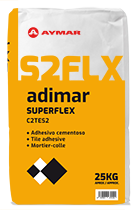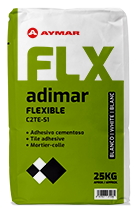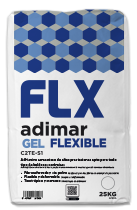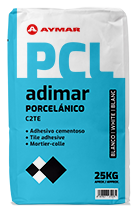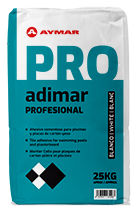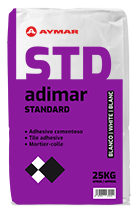Adimar Superflex
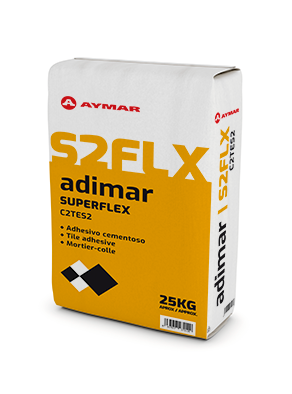
The adhesive for ceramic tiles ADIMAR SUPERFLEX, supplied by AYMAR S.A.U, is a high performance single-component cementitious adhesive, designed, developed and manufactured with selected marble aggregates, cement, synthetic resins and other very specific additives that give it excellent adhesion properties as well as a high flexibility and a negligible slip. Specially indicated for use in thin layer, for ceramic materials of low absorption and large format, for facades, pavements of intense traffic and floors with radiant heating.
Made in Spain.
- Application field
- Instructions of use
- Recomendations of use
The technical characteristics and properties that ADIMAR SÚPERFLEX possesses give it great versatility as far as the field of application is concerned, since it is an ideal adhesive for use both indoors and outdoors and on any type of surface, whether absorbent or not; porcelain stoneware, vitreous mosaic, ceramic tiles, marble, natural stone, mortar plaster supports, concrete, brick, prefabricated blocks, plasterboard plates, waterproofed supports, anhydrite, etc. In addition, this adhesive is suitable for application on floors with radiant heating and cold rooms, maintaining its properties also in a service that requires immersion.
- Preparation of the substrate: The substrate on which the application is to be made must be resistant, dry, clean of dust and free of release agent residues. Do not apply on substrates with a humidity higher than 5%. Check the planimetry of the substrate with a 2 m ruler, verifying that the deviations must be less than 5 mm. In the case of superior deviations it is necessary to regularize them before the placement.
- Preparation of the mixture: add 7,5-8.5 l of water per bag and mix manually or mechanically, with an electric mixer at low r.p.m., to eliminate any possible presence of lumps in the paste, leave the mixture to stand for 5 min and carry out a brief re-mixing.
- Application of the paste: Apply the product on the substrate using a notched trowel, to regularize the thickness, in a maximum extension of 2 m2, applying sufficient pressure so that the minimum contact with the cement is 80%, taking into account if it is necessary to double glue (see consumption table). Lay the tiles, pressing them until the grooves are flattened and the tiles are correctly set with the help of a rubber mallet. It is necessary to check, with the fingertips, periodically that the adhesive has not formed a film on its surface, if this happens, the product should be combed again taking into account that we are still in the margin of the open time of this (if the temporary strip since its application has exceeded the aforementioned open time, the adhesive should be removed and reapplied).
- The application temperature must be between 5 °C and 35 °C above the substrate.
- Do not apply if frost is expected or in full sun.
- On old ceramics and for mounting large or heavy pieces, always double glue.
- It is essential to use safety staples or mechanical staples on facades if the pieces have: a large surface (>60x40 cm), or a weight greater than 40 kg/m2.
- In floors with radiant heating, this must be turned off at least 48 hours before application.
- Cold rooms must remain turned off until the adhesive curing is completed, a minimum of 7 days depending on the environmental conditions.
In case of using ADIMAR SÚPERFLEX in swimming pools, it can be refilled 7 days after its application.
In facade ceramic coverings, a joint of minimum 5 mm should be left between pieces, being this of 2 mm in the case that the product is used in interiors using for it crosspieces that have these dimensional characteristics. The use of the universal joint 0-15 ADIMAR or the technical joint 0-16 ADIMAR is recommended for the sealing of these joints. It is also necessary to take into account the use of expansion joints, every 30 m2 for large format tiles and every 60 m2 in the case of small format tiles, and perimeter joints in cornices and forging projections, always respecting the structural joints of the building.
If the substrate on which the product is applied is deformable, for example plasterboard, it is necessary to check the rigidity of the substrate to ensure that the result of the application is suitable.
Information
- Composed of crushed marble aggregates used in construction, portland cement and additives of both organic and inorganic nature that give it better characteristics in adherence, sliding and transversal deformation.


